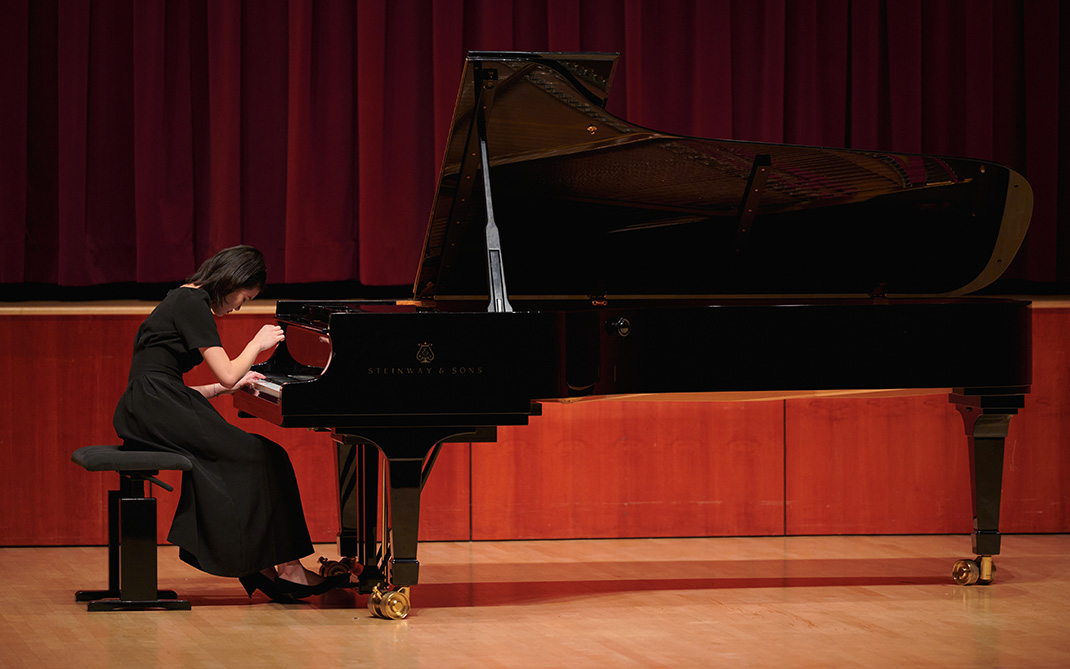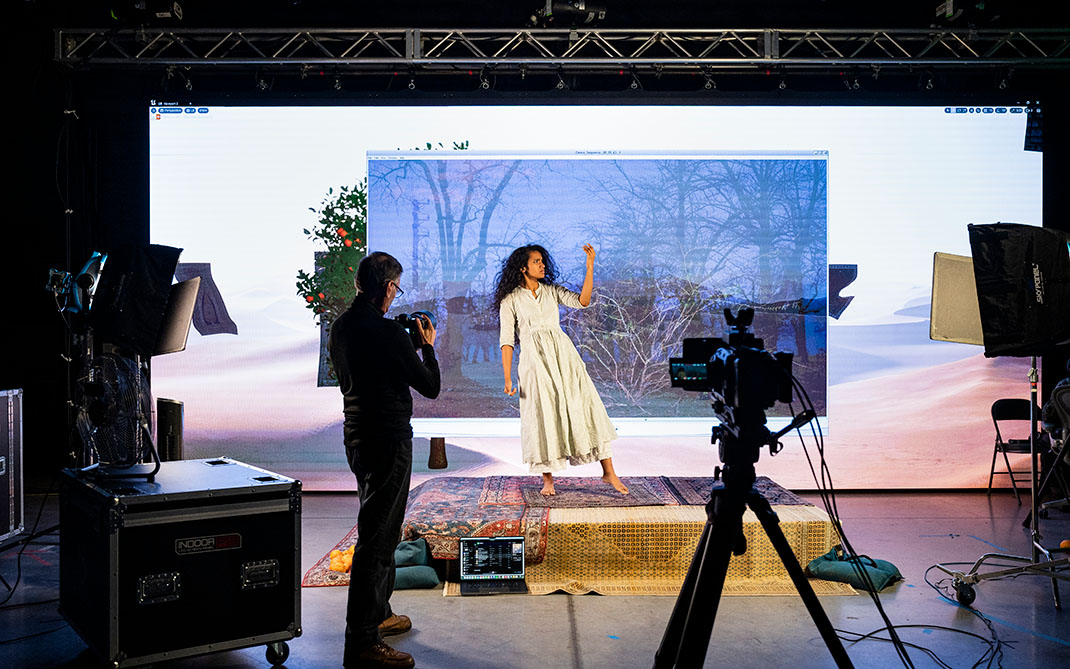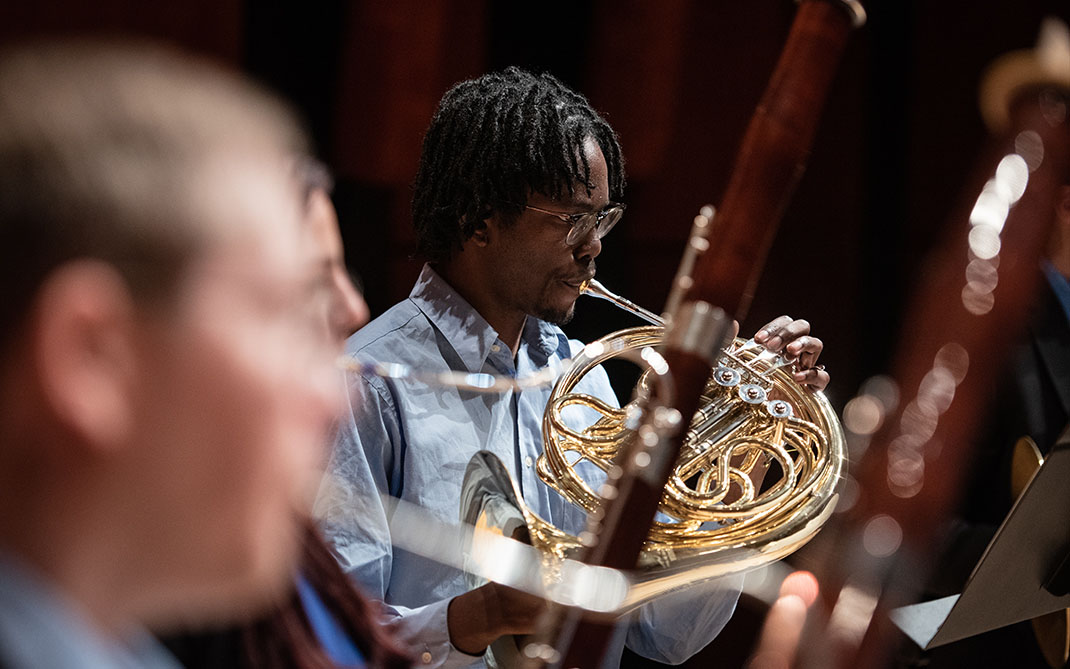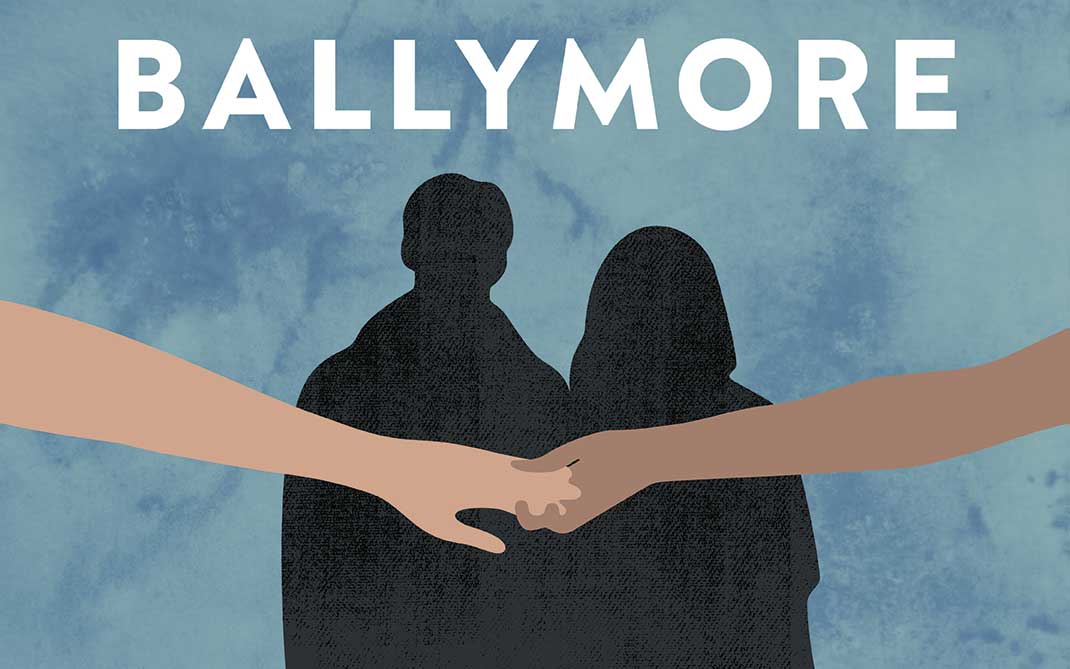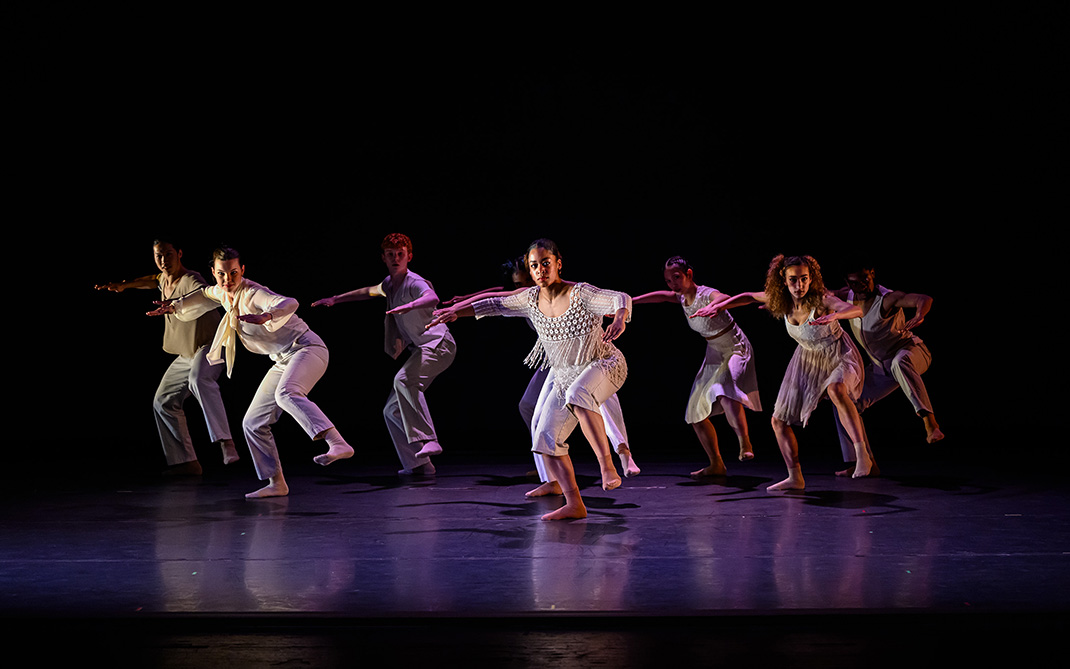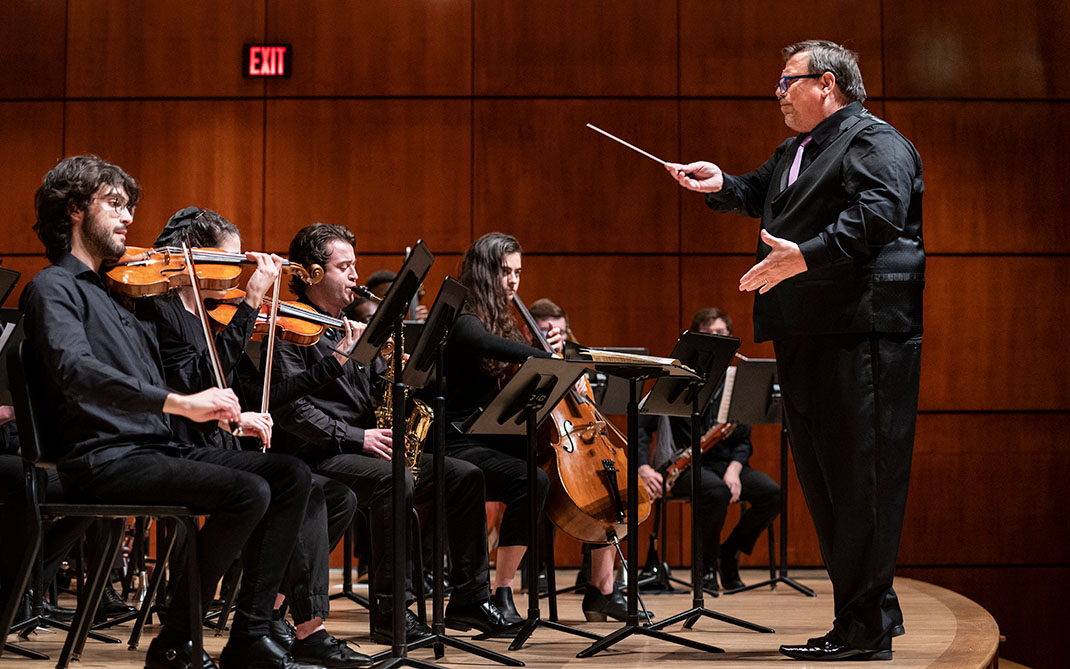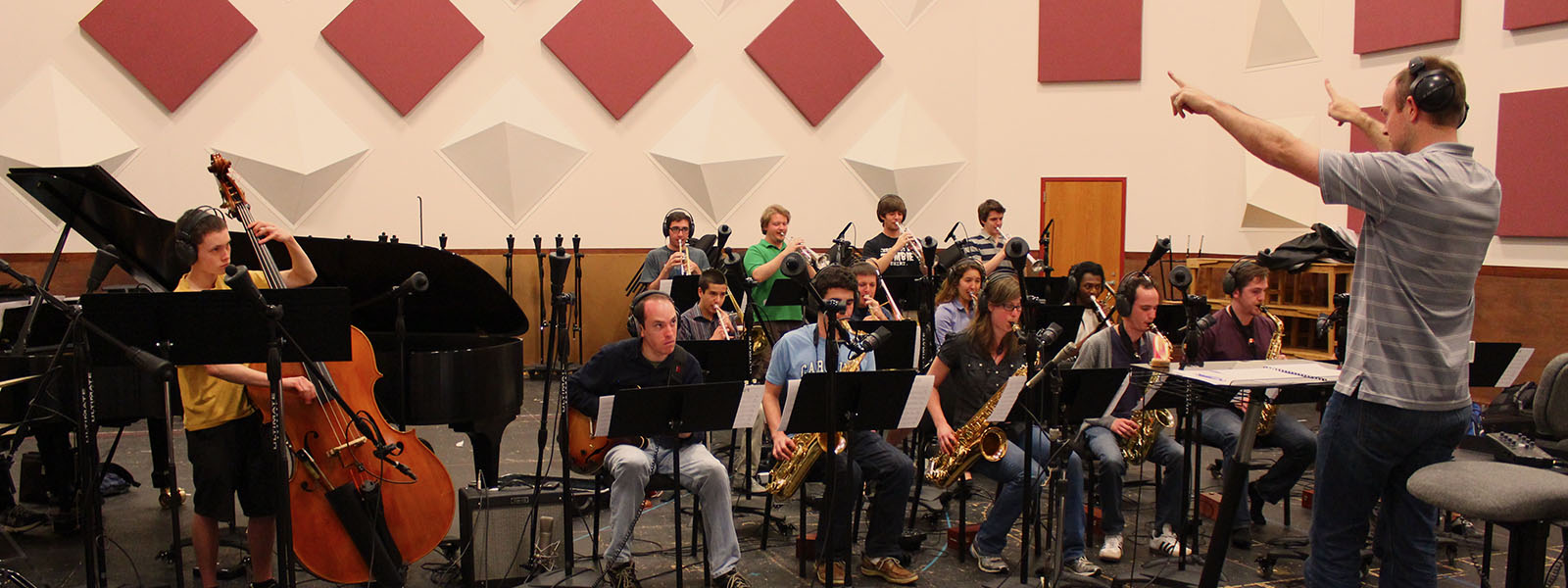Chris Heckman orchestrates a new era for film music at UNCSA
For Chris Heckman, faculty member and film music composer, success means finding harmony between technical expertise and networking — and he wants his School of Music students to take note.
An alumnus of the film music composition program in the School of Filmmaking, Heckman led its transition to the School of Music and its rebranding as the Graduate Composition for Film and Visual Media program. The move has already boosted collaboration and resource sharing between the university’s two composition programs and is expected to strengthen alumni ties and create more networking opportunities.
The transition comes after 14 years of program growth under Heckman’s leadership. He’s helped students master a wide range of skills, from music theory and technology to understanding the business side of the industry. Meanwhile, the program has earned significant recognition, earning the 13th spot on the Hollywood Reporter’s list of “The World’s Best Music Schools.”
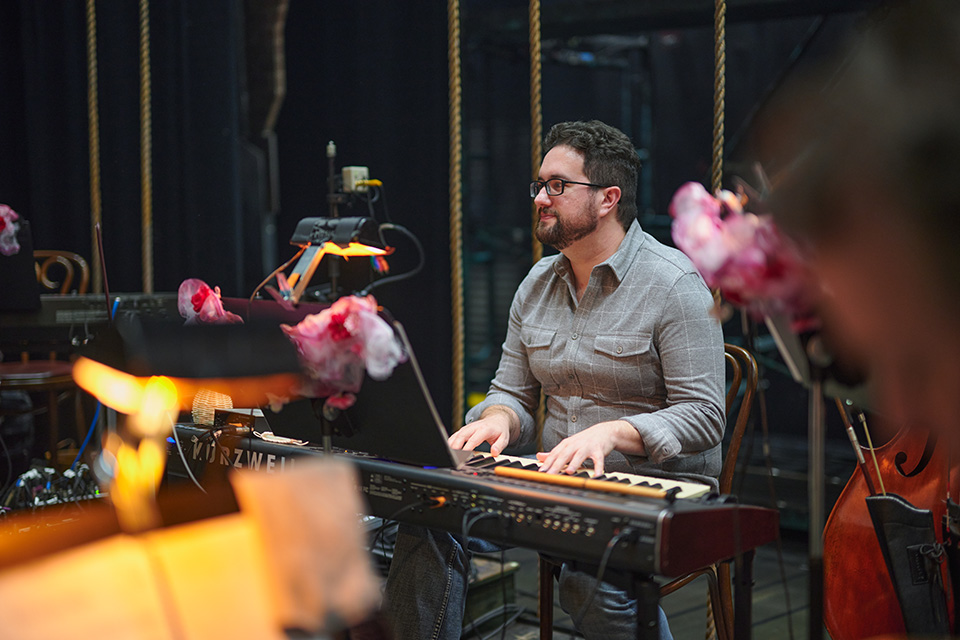
Faculty member and alumnus Chris Heckman performing live for the 2023 Drama production of "As You Like It." / Photo: Wayne Reich
Heckman’s strategy emphasizes what matters most: networking. “The number one thing for students is networking — meeting filmmakers, collaborating with other artists and building relationships. None of the other skills really matter if you don’t have that,” Heckman says. Breaking into and navigating the industry isn’t as simple as answering job ads, he explains. It requires being open and saying yes to opportunities that come your way.
“You’re going to get a degree, but then you have to meet people who are making projects that just so happen to need music,” Heckman says. “That can be scary, but once you get out there and into the network, you’ll find it’s a pretty small world. Doing good work for one person often leads to an opportunity for two more.”
Playing it by ear
Heckman knows first-hand the power of saying “yes” when opportunity knocks. That’s how he ended up composing for “Red Dead Redemption,” an acclaimed 2010 action-adventure video game.
“I didn’t know it was going to be a big, famous game,” Heckman says. “They just asked for saloon music, so I delivered. Then they asked for ragtime piano, so I wrote a few pieces and sent it to them.”
Many of Heckman’s early gigs stemmed from his networking as a UNCSA graduate student. He studied film scoring with David McHugh, writing original music for student films, drama productions and a School of Filmmaking-produced commercial. He also worked as assistant to then-Chancellor and Hollywood Bowl Orchestra Founding Director John Mauceri, accompanying him on tours and live concerts in Vienna and Copenhagen.
After earning his Master of Fine Arts degree, Heckman felt uncertain of his next steps. “I kind of felt like I should go to L.A., but I didn’t know where to get a job, how to get started,” Heckman recalls. He decided to pursue his doctorate degree at the University of California, Los Angeles, where a graduate assistantship position secured him housing and gave him his first experience teaching theory, ear training, musicianship and keyboard skills.
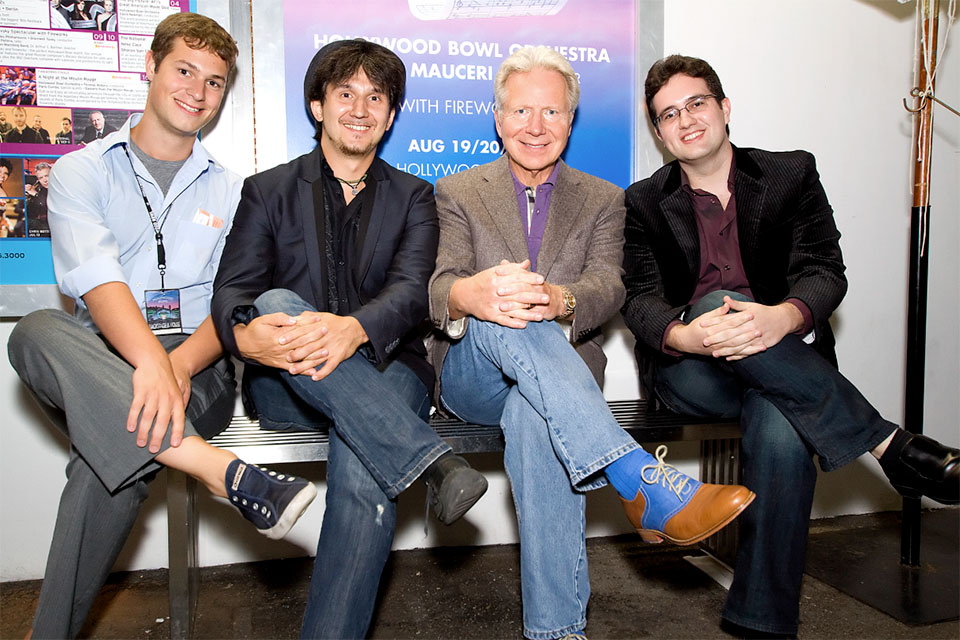
Heckman (far right) with former chancellor John Mauceri (second from right).
Two years into the program, Heckman received a life-changing call from Mauceri, who told him David McHugh — Heckman’s old mentor at UNCSA — had left. His position was open.
“He asked me, ‘Could you do his job? It starts in two weeks,’” Heckman recalls. “I was like, all right, I’ll try this.” Heckman booked his plane tickets and lived bi-coastal for the year, splitting time between classes and work at both UNCSA and UCLA.
“So that was kind of nuts,” he remembers. “The first year I did it, I didn’t really think about it. I just got on a plane every week. I was 25 and it was all adrenaline. That’s probably the way to do it.”
Soon, Heckman was offered the full position, and saying “yes” would land him back at UNCSA and in North Carolina full-time. “I decided it was something I couldn’t refuse,” Heckman says, “because teaching at my alma mater is a pretty special thing.”
Finding the right dynamics
Heckman utilized his own experience in the program to help inform his approach to teaching, thinking about what worked and didn’t work for him as a student. He added private lessons to the program and turned film music analysis into a full history course, a move he credits in part to Mauceri. “I learned a lot from John,” Heckman says. “He was such a student of history, and he knew all these composers. He knew Golden Age major film composers like Miklós Rózsa, Jerry Goldsmith, Elmer Bernstein and David Raksin.”
Students get excited when it’s something they’re familiar with from a cultural perspective...Even very experimental music from the concert world in the 20th century, whether it’s slamming your elbows down on a piano or scraping a string with a piece of metal, is going to elicit some kind of emotional reaction.
Chris Heckman
In his course, Heckman covers these film composers and how their work and other influential film scores have changed film music. He enjoys bridging the gap for the students in his film music theory class, linking techniques used in modern-day film and visual media to historical composers.
“Students get excited when it’s something they’re familiar with from a cultural perspective,” Heckman explains. “Because it’s absolute music or art music, it gets students excited about advanced things they might otherwise turn away from. Absolute music becomes romanticized – it’s telling a story, it’s presenting drama. Even very experimental music from the concert world in the 20th century, whether it’s slamming your elbows down on a piano or scraping a string with a piece of metal, is going to elicit some kind of emotional reaction.”
The move to Music
Heckman’s most impactful change came when he collaborated with School of Music Dean Saxton Rose to move the program from the School of Filmmaking, uniting the university’s two music composition degrees under one roof in the School of Music.
The transition, finalized in fall 2023, reduces redundancy in coursework, allows for sharing faculty and technology resources, and opens music course opportunities for students.

Director of the Graduate Composition for Film and Visual Media program at UNCSA, Chris Heckman.
Heckman’s goal is to have the programs prepare students for a variety of career paths, including those they haven’t yet considered. “Our program is called Composition for Film and Visual Media, which is deliberately meant to be broad,” he says. “I’ve found that learning to compose for film is essentially learning to tell a story with music and have it timed. And that applies to lots of different arts, like dance and theater.”
Through his work at UNCSA, Heckman has been connected to the Winston-Salem Festival Ballet and has written music for ballet productions, including “Dracula.” While writing for ballet was not something he envisioned for himself, Heckman counts the work among his most rewarding and encourages students to explore different pathways.
“As they go through the program, they may realize there is a smaller piece of the pie that they want to focus on and create a whole career around that,” Heckman says. “They won’t know those answers until they dive into the world and become immersed in it. So we need to teach them every skill that they might use.”
Picking up the tempo
Heckman is also aware that technical skills alone won’t prepare today’s students — he’s refining a film music business-focused course for 2025.
“Students need to know about networking, where to find jobs, how to meet people, how to build their website, do their own contract, what they should look for in a contract, how to collect royalties,” he explains.
But teaching networking isn’t always easy.“I can’t do that in a lab or lecture,” Heckman says. “It has to be practical. It has to be that I throw them into a room with filmmakers. A big part of our program is working with filmmakers from our school and other schools. It’s a critical thing, learning to engage and learning to create relationships. Who do you know and who knows you?”
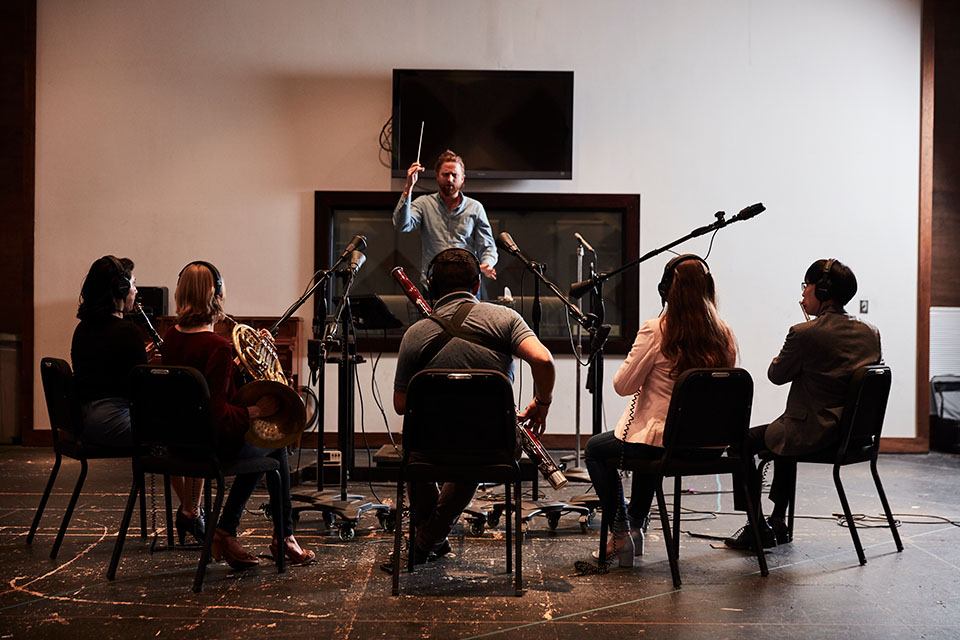
Composition for Film and Visual Media students conducting instrumentalists for a recording. / Photo: Jeremy Cowart
Each year, Heckman takes his students to Los Angeles to meet UNCSA alumni and other professionals. He also enjoys staying in touch with former students, forging friendships that lead to professional connections for his current students.
“I’ve taught them as much as I can, and they go out and do interesting, unique things. Then I’m learning new things about what’s possible from them,” he says. “I’ve started to see over the years that alums are hiring alums. So it’s kind of a tree-branching thing once you get your foot in the door.”
The strong root system for this networking process starts at UNCSA, where Heckman describes the student experience as “unlike any other.“You never know where this is going to take you,” he says. “You just have to say ‘yes’ and go along for the ride.”
Get the best news, performance and alumni stories from UNCSA.
SUBSCRIBE TO OUR NEWSLETTER(opens in new tab)
November 25, 2024
